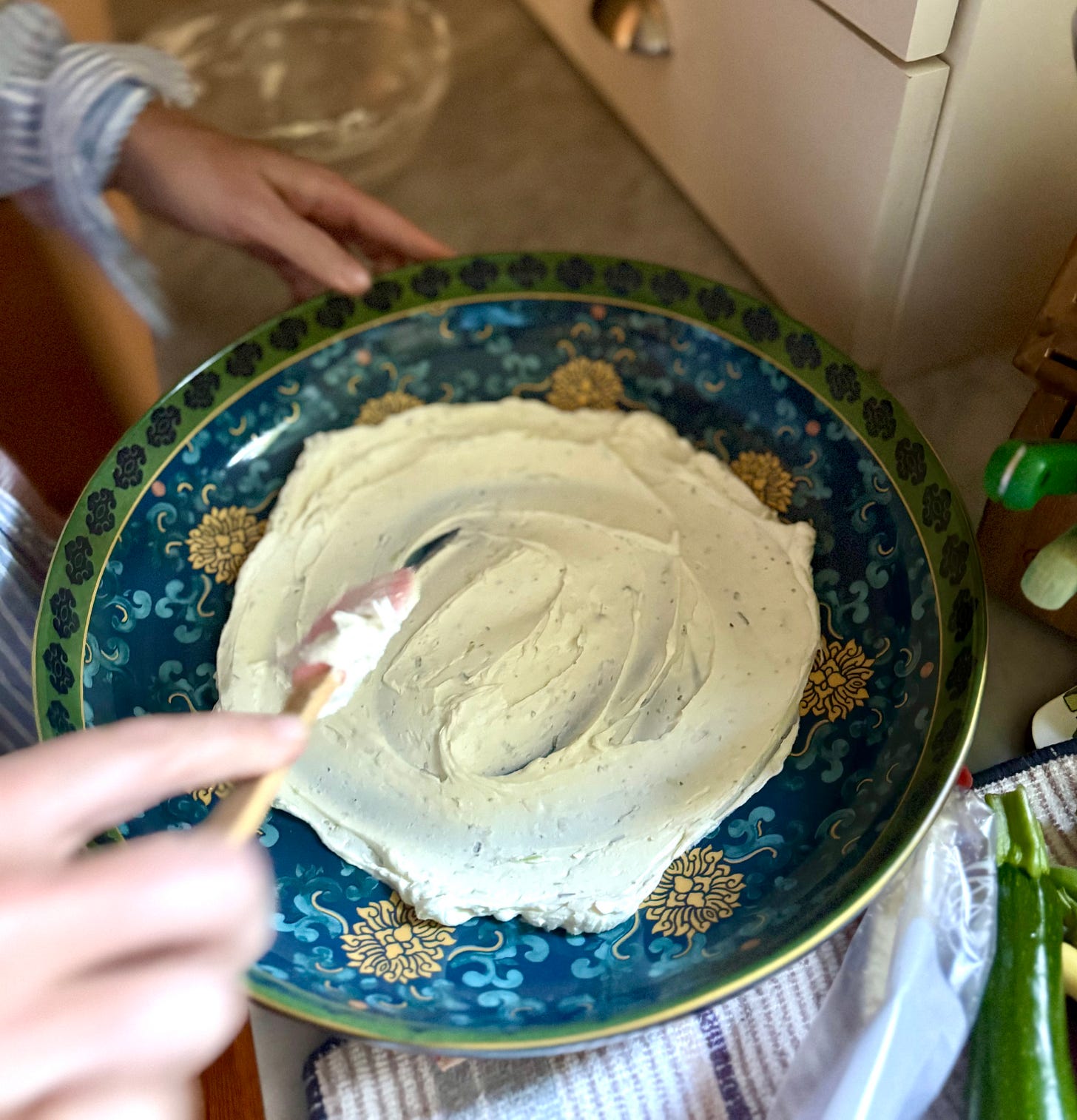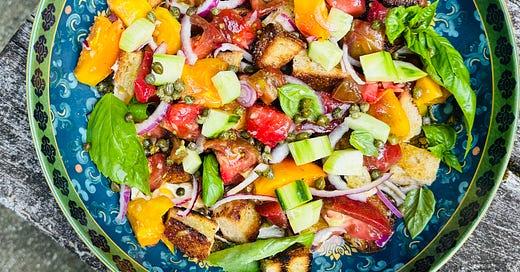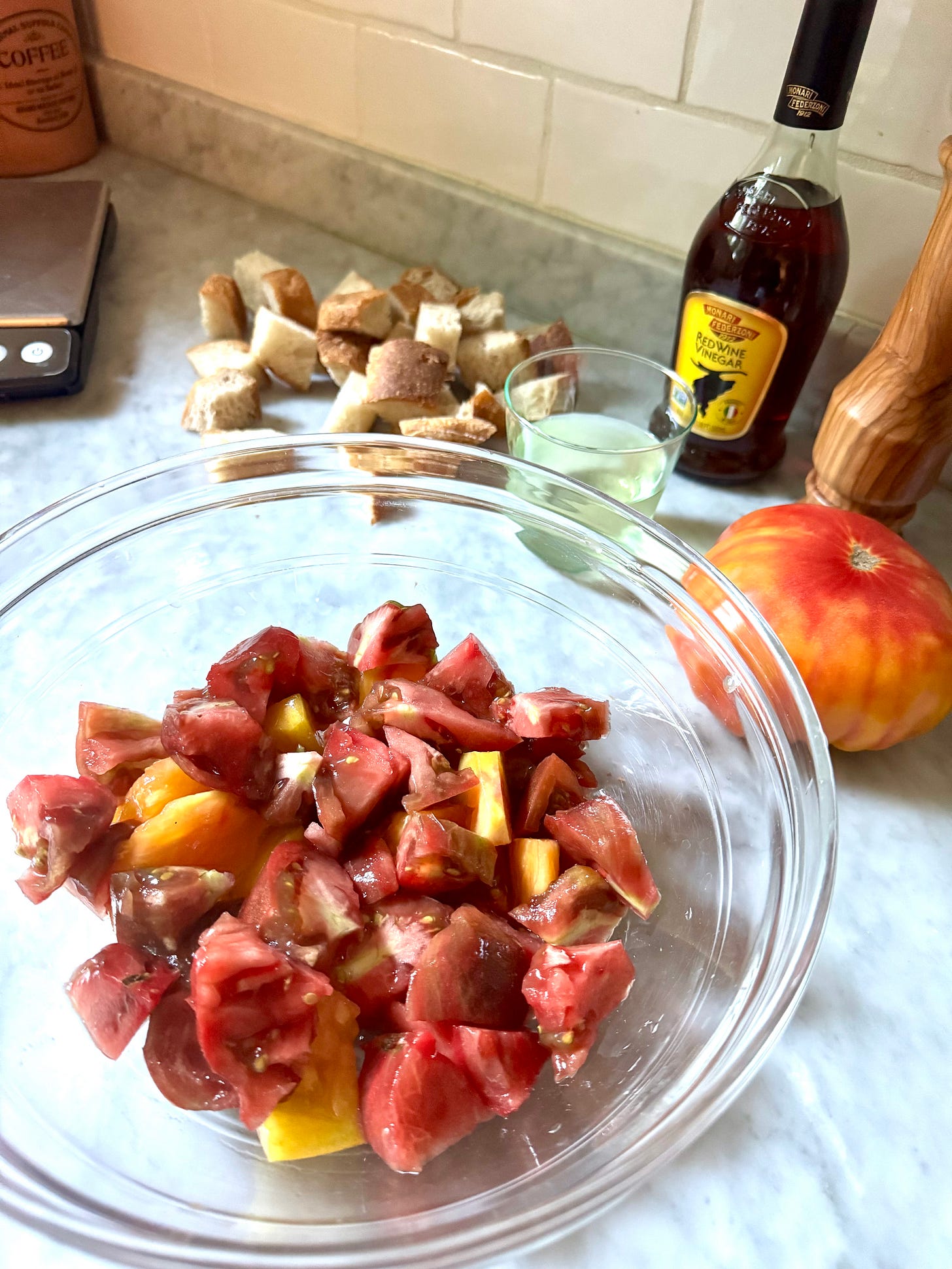A Perfect Panzanella With Loads of Tomatoes - No. 348
Make this blueprint salad all summer long
WE PLAYED A BOARD GAME called Apples to Apples over the July 4th holiday. Someone is the ‘’judge’’ and reads aloud a word and its synonyms written on a green card. The other players look at their cards and see if one comes close to that description.
The secret to winning this simple game is knowing the personality and idiosyncrasies of the judge. If the judge has a sense of humor, you do humor, for example. But when my husband became judge and the word ‘’Beneficial: advantageous, favorable, useful,’’ was on his card, my daughter knew immediately which card to toss in the center of the table.
‘’Leftovers.’’
We like them. And our family can’t seem to get rid of leftover bread, stashing half baguettes and end slices of sandwich loaves in the freezer. Who knows when you might need crispy crostini or bread crumbs whizzed in the food processor with garlic and Parm? For our family of five, I recall my mother freezing the last hamburger bun in each package of six. The day before Thanksgiving, she’d place a pan of cornbread in the oven and walk downstairs to the big chest freezer in the basement and pull out enough buns to crumble along with that cornbread into the best turkey dressing ever.
In Italy in the summertime, leftover bread is religiously saved for salad…Panzanella.
Substack writer and cookbook author Guilia Scarpaleggia has written about Panzanella in her Letters from Tuscany newsletter. She and her husband Tommaso teach cooking classes in the Tuscan countryside between Siena and Florence. She says when sourdough bread has gone stale, tomatoes have ripened, and you’ve got crisp cucumbers and onions as well fresh basil, there is Panzanella in Tuscany.
It is one of the many traditional Italian recipes that have sprung from humble roots, something she calls ‘’Cucina Povera,’’ also the title of her latest cookbook. And here’s a fun fact: Panzanella was an ancient Tuscan recipe immortalized by Renaissance painter and poet Bronzino.
Bronzino wrote of a pre-tomato, green panzanella made with onion, cucumber, purslane, and arugula. (There were no tomatoes in Europe until Spanish explorers brought them back from South America and introduced them in the late-16th century.)
The oldest Panzanella salads, says Guilia, were called “washed bread’’ because that’s the first step of the recipe. Leftover bread was soaked in water to revive it.
While there are countless variations of Panzanella in Italy, the one Guilia was raised on was simple and had the soft texture of porridge. Her grandmother ate it for breakfast.
This basic Tuscan Panzanella was constructed of rustic bread, either soaked in water or some water mixed with vinegar. You add tomatoes, cucumbers, thinly sliced red onion, and fresh basil and drench everything in extra virgin olive oil, salt, freshly ground black pepper, and red wine vinegar.
Here is her recipe.

When I got into the kitchen to make Panzanella, I wanted to make this salad all about the fat, ripe tomatoes coming into season.
My own garden tomatoes won’t be ripe for another week. Heavy early summer rains didn’t delay planting, but they did make my small, fragile tomato plants fight for their lives! Thankfully, produce markets and farm stands near me are selling ripe Cherokee Purple tomatoes as well as fat yellow tomatoes.
In tomato season, I’ve always turned to the late, great Marcella Hazan. And she did not disappoint with her Panzanella recipe, which she first shared in The Classic Italian Cook Book (Knopf), in 1976, and later in Essentials of Classic Italian Cooking (Knopf) in 1992. Marcella didn’t mince words, so I knew what wisdom she laid out in the recipe’s head notes were good as gold. She said the old Tuscan method of soaking bread in water works with real Tuscan bread, but if all you have is a poor substitute, forgo it. She prefers bread fried in olive oil for Panzanella.
Now she had my attention.
I envisioned a Panzanella with either the fried chunks of bread or what about grilled sourdough bread slices cut into cubes?
So I sliced some of the sourdough, drizzled it with oil, heated the gas grill, and when very hot, turned it off. I placed the bread onto the grill, covered the grill, and left it for three to four minutes, enough time to leave grill marks.
Then I cubed the rest of the bread, heated an iron skillet with good olive oil, not your best extra virgin, and fried the cubes until crispy on all sides. I drained them on a rack over a half sheet pan. (You could also toss bread cubes with olive oil and roast on a sheet pan at 400ºF until crispy.)
While Guilia says Panzanella is not about bread croutons, I found them irresistible. Especially the fried croutons. Next to the tomatoes, they were the focal point of this salad. Well, next to the tomatoes and red wine vinegar. That vinegar lifts the salad to new heights.
In fact, Guilia says good red wine vinegar makes Panzanella the refreshing salad of summer. David Lebovitz, who has shared Marcella Hazan’s recipe for Panzanella in his Substack, convinced me to upgrade my red wine vinegar. While I didn’t find the nice French vinegars he has access to in France, I did use a decent Italian vinegar called Monari Federzoni from Whole Foods.
What’s your favorite red wine vinegar?

My daughter was visiting and suggested a further riff: We make a soft cheese smear for the bottom of the bowl to add some creaminess. She used about a half a round of Boursin cheese, blended it in a bowl with 2 tablespoons cream cheese, and a little fresh lemon juice to moisten it. (You could use goat cheese instead of the Boursin.) We spread this into the bottom of a wide serving bowl as step one. Step two was the addition of bread cubes plus other vegetables, and step three was dress and toss.
I appreciate the history and legacy of the Panzanella salad, but I also love its adaptability to whatever is in the summer fridge and coming out of the garden.
Really great recipes hold up to experimentation. And Panzanella is one of those recipes.
In spite of Panzanella, board games, and gathering with friends and family over the holidays, it’s with a heavy heart that I write this newsletter. The tragic news reports from central Texas and its Hill Country have hung like a dark cloud over our house and possibly yours.
I’ve sent children away to summer camp. I’ve been that parent who didn’t want to think about the unimaginable happening and prayed for a safe return. My deepest sympathies to all those who have lost someone due to the floods.
Board games and communal salads force us to turn off phones, computers, and TVs long enough to gather. We need each other to play these ridiculous games and help eat two pounds of tomatoes!
We just need each other.
- xo, Anne
P.S. For paid subscribers, next week I share another Tuscan recipe…a pasta recipe from Frances Mayes, author of Under the Tuscan Sun.
And for all you bargain hunters, check out the just published Amazon Prime Day special on my cookbook, Baking in the American South. My book is a crazy 46% off with a $24.49 price tag!
What are you making with summer tomatoes? Texas friends, please share how we can help.
THE RECIPE:
A Summertime Panzanella
This recipe is a hybrid of so many other wonderful recipes from esteemed authors such as Marcella Hazan, Guilia Scarpaleggia, and David Lebovitz. David writes that if your tomatoes are not quite ripe, you can enliven them with a little salt, and drain in the colander for 15 minutes. But save those tomato juices! Toss them on the salad as well. If you want to make this salad a meal, add tuna, grilled fish, or three to four anchovies. Panzanella is perfect right after it’s made or keep it at room temperature for an hour or so before serving so the bread soaks up all the wonderful juices.
Makes 4 to 6 servings
6 to 8 ounces (170 to 226 grams) stale sourdough or country-style bread
Olive oil for frying, grilling, or roasting the bread
1/2 cup sliced red onion
Cold water to cover the onion
1/2 cup diced cucumber (or more if you like)
Sea salt or kosher salt to sprinkle on cucumbers
1/4 cup red wine vinegar, divided use
3 cloves garlic, minced
1 teaspoon sea salt or kosher salt
1/2 cup extra virgin olive oil for salad dressing
1 to 2 tablespoons capers
2 pounds (908 grams) ripe tomatoes, about 4 to 5
Salt and pepper to taste
Big handful of basil leaves, about 20, torn into pieces
Optional goat cheese smear:
3 ounces (85 grams) soft goat cheese or herbed cream cheese (Boursin)
2 tablespoons cream cheese
Juice of half a lemon (about 2 teaspoons)
Cut the bread into 3/4-inch squarish pieces if you want to roast or fry them. Cut into 3/4-inch slices if you are grilling the bread. Use about 1/4 cup olive oil to toss with the bread and roast on a half sheet pan at 400ºF until crispy, 15 to 20 minutes, watching them closely and toss with a spatula so they brown on all sides. Or, fry in olive oil or a mix of vegetable oil and olive oil at 350ºF, stirring constantly, until they are browned on all sides, about 5 to 6 minutes. Drain on a wire rack. If grilling, drizzle both sides of the slices with about 1/4 cup of the olive oil, and place on a heated grill that has been turned off. Grill on the first side until you get grill marks, and then turn and grill until lightly marked on the second. Remove, cool, and cut into rough pieces. Set the bread aside.
To prep the onion and cucumbers, soak the onion in cold water to cover. Add a splash of the red wine vinegar. Salt the cucumber and let drain in a colander while you prep the salad dressing.
For the dressing, pour the rest of the red wine vinegar into a small bowl, and whisk in the garlic and salt. Whisk in the olive oil. Stir in the capers. Set aside.
For the tomatoes, peel if desired. Core and cut into about 4 to 6 wedges per tomato. Place in a bowl to rest. If your tomatoes are not great tasting, sprinkle with a little salt and pepper.
Tear the basil leaves, and set aside a few untorn for garnish.
For the smear, whisk together the soft cheese, cream cheese, and lemon juice with a fork until creamy. Smear on the bottom of a serving bowl with a rubber spatula.
To assemble the salad, scatter the bread cubes on top of the smear. Drain the tomatoes, saving the juice from them. Scatter the tomatoes, drained onion, and cucumber over the top. Pour the dressing and any juice from the tomatoes over the mixture. Add the torn basil leaves. Toss very gently so as not to disturb the smear on the bottom. Garnish with extra basil leaves, and serve.










I have always used Monari Federzoni's Balsamic vinegar, but I haven't tried their other vinegars.
The tragic news from central Texas is covered here in the Uk. Rest assured our thoughts are with them. Julie